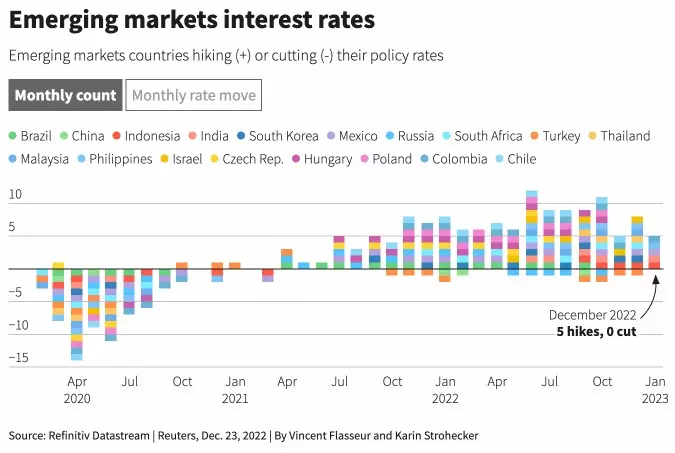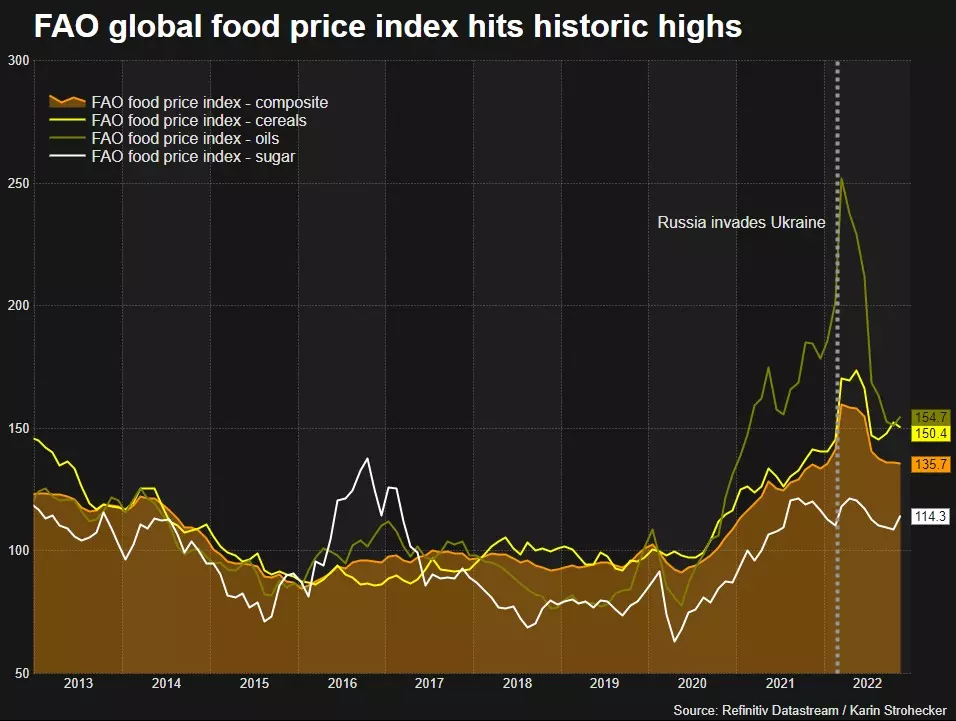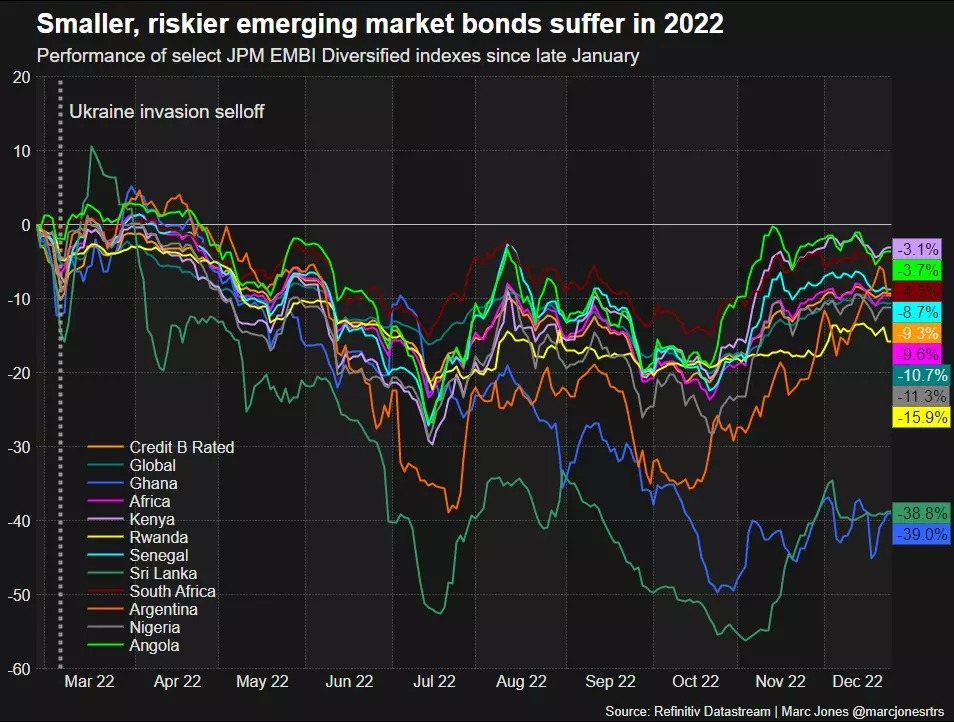London December 28 2022: It has been a rough 12 months for emerging markets that have seen more governments stumble into default, currencies suffer and double-digit losses in stocks and bonds alike – though many investors are optimistic that 2023 could bring some relief.
Below are the events, trends and topics investors expect to shape the outlook for emerging markets next year.
1/ HIGH RATES, LOW GROWTH
A slowing pace of interest rate hikes in the United States and other major economies could set the stage for an emerging markets recovery in 2023, with a softer dollar and falling inflation providing much sought relief.
Developing economies are expected to cling to their growth differential over developed peers, but recession fears in the United States as well as Europe are casting a pall over global markets generally – especially in the first half of the year.
“The economic downturns along with the aggressive monetary tightening and geopolitical and commodity shocks that induce them will be temporarily painful in financial and emerging markets,” said David Folkerts-Landau, group chief economist at Deutsche Bank.
Recovery could be delayed if emerging central banks lack room to lower interest rates for most part of the year.

2/ CHINA REOPENING
China’s reopening following its COVID-19 lockdowns will be bumpy, but making up nearly a fifth of global gross domestic product the prospect of a sharp upswing at a time of slow global growth is enticing.
Analysts expect a sharp pick-up in consumption and investment in the world’s second-largest economy from mid-2023 onwards.
“If you look at the savings rate for China right now, it’s very elevated,” said Erik Zipf, head of emerging market equities at DuPont Capital. “We think that’s going to get spent as soon as people feel comfortable to go out, that’s going to provide a pretty big tailwind from an economic perspective.”
3/ WAR IN UKRAINE
Russia’s invasion of Ukraine roiled markets and the world economy – and how the war progresses in 2023 could be no less important, whether that would be a continuation, escalation or progress towards finding a resolution.
Globally, the war has transformed energy markets and inflation pressures, food security and geopolitical risk perception – factors that are often more keenly felt in emerging economies. Emerging Europe has also felt the immediate humanitarian impact – from refugee movements to Russia’s brain drain.

4/ DEBT REWORKS
A growing list of countries are in debt distress in the wake of COVID-19 and the war in Ukraine: Zambia and Ethiopia are trying to overhaul debt burdens under the Group of 20 Common Framework. Sri Lanka and Ghana defaulted in 2022.
But a more complex mix of creditors – including the emergence of China as the world’s top bilateral lender – compared to previous episodes of debt distress have made proceedings slow and complex.
“To get them all singing the same song in the same key is quite challenging”, said Tim Samples, associate professor of Legal Studies at the Terry College of Business.
The number of countries locked out of capital markets among smaller, riskier economies is at historic highs – though there might be a saving grace.
“There’s not actually a lot of debt maturing next year,” said Carmen Altenkirch, emerging markets sovereign analyst at Aviva Investors. “The country that’s probably most at risk is Pakistan.”

5/ BRAZIL UNDER LULA 2.0
President-elect Luiz Inacio Lula da Silva will take office on Jan. 1 with markets already looking for signals of a fiscal anchor to control spending in Latin America’s largest economy.
Policymakers have highlighted inflationary risks arising from da Silva’s 168 billion reais ($31.6 billion) spending proposal to meet campaign promises.
“Investors want to know if the debt-to-GDP in Brazil is explosive or under upward pressure, whether we’re hitting 100% debt to GDP anytime soon, or we can stabilize it over the next two or three years,” said Gordian Kemen, head of EM Sovereign Strategy (West) at Standard Chartered Bank.
6/ TURKEY ELECTIONS
President Tayyip Erdogan could face the biggest political challenge of his two decades in power as Turks head to the ballot box in the most high-profile vote in emerging markets.
The country has grappled with surging living costs and a plunging currency, with the lira falling to a record low against the dollar in recent days. Years of unorthodox monetary policy have seen many investors cut exposure to the country’s assets. A change in leadership could mark a stellar turnaround.
“This is potentially the most interesting story of 2023, one way or another,” said David Hauner, head of EM Cross-Asset Strategy & Economics, EMEA, Bank of America Global Research.
7/ CASTING A VOTE
A number of other emerging market countries face elections. Voters in Africa’s most populous nation Nigeria choose their next president in February, with incumbent Muhammadu Buhari not taking part due to term limits.
In Latin America, Argentina will hold presidential elections in October. Two-time president and Vice President Cristina Fernandez de Kirchner said she “would not be a candidate for anything” in the general vote, after an Argentine court sentenced her to six years in jail in a high-profile corruption case.
In Poland, an election expected in autumn might see voters ousting the country’s ruling nationalist Law and Justice party (PiS), which could reshape Warsaw’s tense relations with Brussels.











